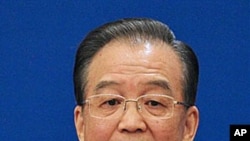Chinese Premier Wen Jiabao offered condolences to Japan, which is recovering from a massive earthquake and resulting tsunamis. His comments came Monday at a news conference that is regularly held at the end of the annual session of the country’s legislature.
In spite of a recent territorial dispute with Japan, Chinese Premier Wen Jiabao made a special effort at the end of his two-hour news conference Monday to say something about the recovery efforts there.
Wen extended China’s condolences for the lives lost in Japan’s devastating earthquake and tsunamis and expressed sympathy to the Japanese people.
He says China has empathy because it is also an earthquake-prone country and he pointed to Japanese aid to China after the Wenchuan earthquake in 2008.
China has provided $4.5 million in humanitarian aid to Japan and a Chinese rescue team arrived there, Sunday. Wen says China is ready to provide more assistance, as needed.
Wen’s comments came at the end of the lengthy news conference that marks the end of the annual session of the National People’s Congress.
Earlier Monday, the legislature’s nearly 3,000 delegates approved China’s next five-year plan, which sets out the Communist leadership’s overall goals from this year through 2015.
Wen says one of the government’s main concerns for this year is controlling inflation.
Wen says inflation is like a tiger - once it has been set free, it will be, in his words, "very difficult" to put it back in its cage.
He says there are external reasons for inflation - specifically higher global prices for oil and grain. He also blames the so-called quantitative easing monetary policies in countries like the United States for causing what he describes as "drastic fluctuations" in currency exchange rates and commodity prices.
The Chinese premier says rising labor costs and rising prices of basic goods inside China are also fueling inflation.
Wen acknowledges the need for political reform as essential for the continued success of economic restructuring. But he gave few details and said political reform in China would be a gradual process.
Meanwhile, Mr. Wen says it is not right to draw an analogy between China and the turbulent political situation in the Middle East. He says the government feels that the lives of ordinary Chinese people have improved to the point that the country is now the second largest economy in the world. At the same time, he acknowledges several potential problems - including the fact that China is a developing country with a large population and what he calls a "weak economic foundation and uneven development".




